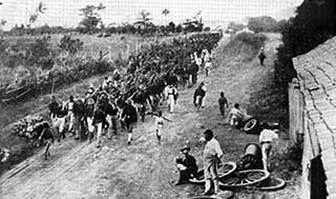 N.Y. Volunteers 17th Regiment in Puerto Rico, July 1898. This is an important week in Caribbean history. One hundred and thirteen years ago yesterday, the United States invaded Puerto Rico as part of the military transfer of colonial possessions from the dying empire of Spain to the expanding empire of the United States. On July 25, 1898, U.S. troops landed in the bay of Guánica, on the south coast of Puerto Rico. They were led by General Nelson Miles, who headed the first U.S. military government of my country. (Miles played a leading role in almost every U.S. campaign against the Native peoples of western North America, including the Lakota, Nez Percé, Kiowa, Comanche and Apache.) On August 13, 1898, Spain signed a treaty handing over the last of its American possession to the United States. 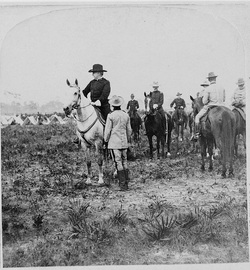 Nelson Miles in Puerto Rico Puerto Rican responded in different ways to U.S. rule. Some of my ancestors welcomed it. Spanish rule was repressive and relied on a massive and rigid bureaucracy that made it difficult to get anything done. Some Puerto Ricans, particularly those who would benefit from a less restricted climate for commerce, saw the U.S. as a dynamic and progressive alternative. In the spring of 1897 a group made up primarily of landowners from the western towns of Sabana Grande and Yauco, tried to take over the Yauco garrison and seize weapons. Among their goals was U.S. intervention. My great-great-grandfather José Roque Moure Rodriguez came to Puerto Rico from the Galician port city of Ferrol around 1875, in search of his father, who was a medic in the Spanish army. He arrived only to learn his father had recently died, and decided to stay. Although he was poor, he was literate, and ended up working for some of the landed gentry as an accountant and a tutor to their children, including the autonomist leader Luis Muñoz Rivera. His wife, Monserrate Gomez, was a criada in that home, a servant raised by wealthy families from childhood. The autonomists wanted a greater degree of self-rule under Spain; full citizenship as Spanish subjects. Don Roque supported the autonomist cause and would stand on a rock near his house to read their newspaper, La Democracia, edited by Muñoz Rvera, out loud to his neighbors. In November of 1897, in the face of a crumbling empire, U.S. bombardment of Puerto Rico's capital, and political pressure from within and without, Spain granted autonomy to Puerto Rico. For a few months, Puerto Ricans were able to exercise limited self-rule. 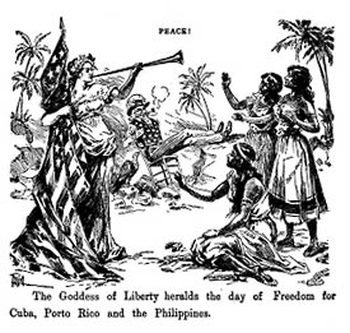 U.S. citizenship was not imposed on Puerto Ricans, along with conscription into the military, until 1917, when soldiers were needed for World War I, but a significant number of Puerto Ricans, including don Roque, signed up as soon as they could. But full citizenship for Puerto Ricans was not what the U.S. government had in mind. (It still isn't. Puerto Ricans serve in the U.S. military, and the island's economy is dominated by U.S .corporations that pay no taxes and pollute at will, but Puerto Ricans in Puerto Rico can't vote for president and have no representation in congress.) The rhetoric of the new regime was all about bringing civilization to savages and managing their resources better than they could for themselves. 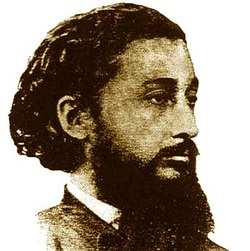 Ramón Emeterio Betances I want no colony, under Spain or under the United Sates. What are the Puerto Ricans doing, that they do not rebel? These are the words of the great independentist leader, Ramon Emeterio Betances, a mulatto doctor and leader of the 1868 uprising known as the Grito de Lares. Many Puerto Ricans agreed with him. For the poor, the prospect of greater freedom to exploit for the landowners had no appeal at all. At the same time that the landlords of Sabana Grande were inviting a U.S. invasion, bands of rural outlaws called tiznados, because they disguised themselves by rubbing charcoal on their faces, were raiding the haciendas, seizing livestock and produce and setting fire to property. 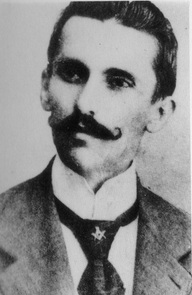 Evaristo Izcoa Díaz Another of my great-great-grandfathers was Emiliano Díaz. His first cousin, Evaristo Izcoa Díaz was a radical journalist who wrote for La Democracia, and also started a series of more militant newspapers, with names like El Combate and La Bomba. Cousin Evaristo was in and out of jail, andincluding prison in Spain, where he contracted tuberculosis. When the U.S. invaded, he tried to raise a small army of five hundred to fight a guerrilla war against the occupiers. But the catastrophic hurricane San Ciriaco devastated the western part of the island where the rebels were based, and the plot disintegrated. One hundred and ten years ago, just two weeks before his death, Don Evaristo climbed out of his hospital bed, escaped the vigilance of his doctors and raised the illegal flag of Puerto Rico in the plaza of Ponce, on the third anniversary of the invasion. 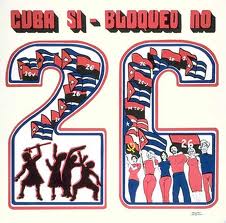 That was yesterday's anniversary, a landmark in the ongoing pain of Puerto Rico's looting at the hands of U.S. capitalism, currently in one of its more brutal phases. The pace of wealth extraction has skyrocketed, privatization has run amuck and police repression of student protesters aginst the assault on public education is extreme, according to a recent ACLU report on human rights violations on the island. Today's anniversary is as closely tied to yesterdays' as the two wings of one bird in a fanous poem by Puerto Rican poet Lola Rodriguez de Tió. She was referring to the deep ties that link the liberation struggles of Puerto Rico and Cuba, which, she said, receive bullets and flowers in the same heart. The 1868 uprising that Betances led was coordinated with another in Cuba. U.S. troops invaded and occupied both countries during the Spanish American War, and both became fountains of profit for U.S corporations. Fifty-eight years ago today, a hundred and forty Cubans, led by a young lawyer named Fidel Castro, attacked the Moncada barracks, hoping to capture weapons and spark an insurrection against the U.S. backed dictator Batista. The attack was a disaster, but it did in fact ignite a revolutionary movement, which led, five and a half years later, to victory, and the establishment of the first socialist country of the Americas. Weeks later, Puerto Rican leftists founded the Movimiento Pro Independencia, a response that was echoed throughout the so-called Third World, and especially in the Americas. Cuba's revolutionaries gave hope to the colonized and exploited of the continent, and although Cuban doctors have restored the eyesight of 1.3 million Latin Americans, provide free healthcare in dozens of countries, build hospitals in Haiti, and give a free medical school education to anyone who will serve the underserved in their own countries, hope continues to be Cuba's most important export, and is the real reason for the United Sates' long, cruel blockade. A society run for the benefit of its own people, and most especially the poor, instead of the stockholders of foreign companies; a successful society, that feeds, educates, heals and celebrates its once destitute citizens, is an imperialists' nightmare, and a subjugated people's dream. When I visit Cuba, I always imagine I am visiting the future, that like yesterday's Havana mansions and casinos, someday the exclusive country clubs and luxury condos that squat on our lovely beaches like birds of prey, will become the schools and hospitals of the People's Republic of Puerto Rico, and then all the ghosts of my history, the tizanados who wanted land and food, the criadas who wanted homes of their own, who wanted dignity and independence, the abuelo who wanted citizenship and the abuelo who wanted justice, will all dance in the plaza where Evaristo once raised his flag, and be glad. **************************************************************************************
2 Comments
Your comment will be posted after it is approved.
Leave a Reply. |
About Aurora
Aurora Levins Morales is a disabled and chronically ill, community supported writer, historian, artist and activist. It takes a village to keep her blogs coming. To become part of the village it takes, donate here. Never miss a post!
Click below to add this blog to your favorite RSS reader: Archives
September 2017
Categories
All
|
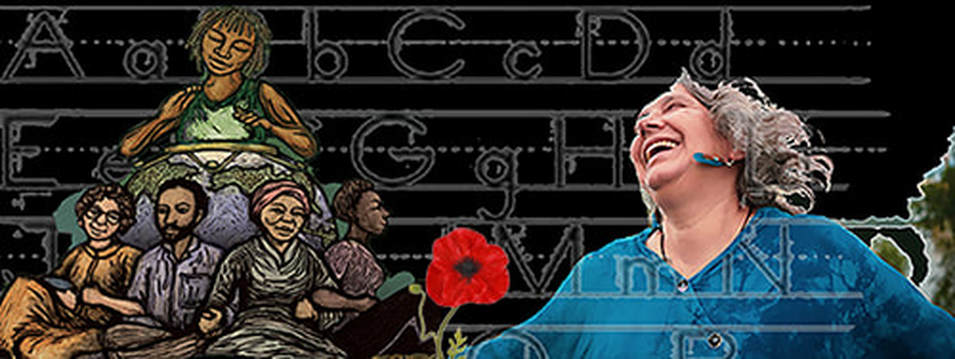
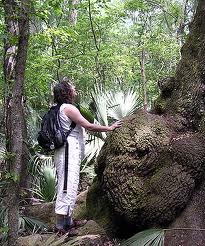
 RSS Feed
RSS Feed
